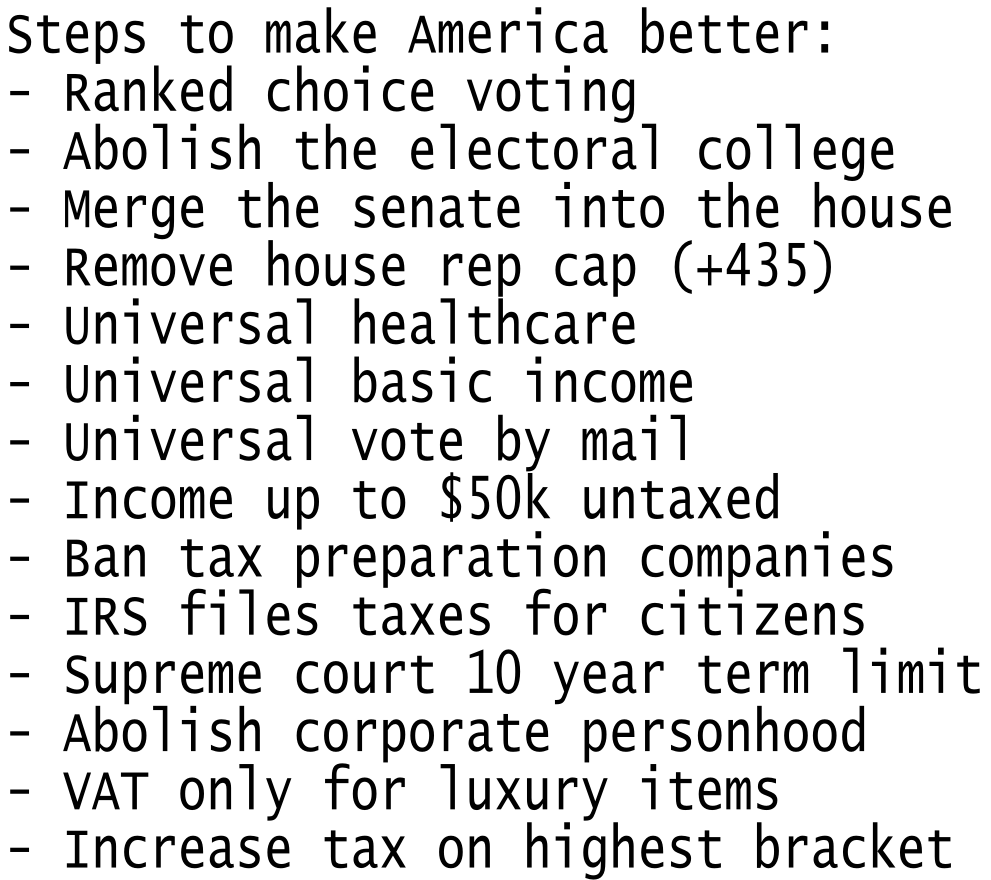this post was submitted on 07 Mar 2024
915 points (91.6% liked)
General Discussion
13508 readers
1 users here now
Welcome to Lemmy.World General!
This is a community for general discussion where you can get your bearings in the fediverse. Discuss topics & ask questions that don't seem to fit in any other community, or don't have an active community yet.
🪆 About Lemmy World
🧭 Finding Communities
Feel free to ask here or over in: !lemmy411@lemmy.ca!
Also keep an eye on:
- !newcommunities@lemmy.world
- !communitypromo@lemmy.ca
- !new_communities@mander.xyz
- !communityspotlight@lemmy.world
- !wowthislemmyexists@lemmy.ca!
For more involved tools to find communities to join: check out Lemmyverse!
💬 Additional Discussion Focused Communities:
- !actual_discussion@lemmy.ca - Note this is for more serious discussions.
- !casualconversation@lemm.ee - The opposite of the above, for more laidback chat!
- !letstalkaboutgames@feddit.uk - Into video games? Here's a place to discuss them!
- !movies@lemm.ee - Watched a movie and wanna talk to others about it? Here's a place to do so!
- !politicaldiscussion@lemmy.world - Want to talk politics apart from political news? Here's a community for that!
Rules and Policies
Remember, Lemmy World rules also apply here.
0. See: Rules for Users.
- No bigotry: including racism, sexism, homophobia, transphobia, or xenophobia.
- Be respectful. Everyone should feel welcome here.
- Be thoughtful and helpful: even with ‘silly’ questions. The world won’t be made better by dismissive comments to others on Lemmy.
- Link posts should include some context/opinion in the body text when the title is unaltered, or be titled to encourage discussion.
- Posts concerning other instances' activity/decisions are better suited to !fediverse@lemmy.world or !lemmydrama@lemmy.world communities.
- No Ads/Spamming.
- No NSFW content.
founded 2 years ago
MODERATORS
you are viewing a single comment's thread
view the rest of the comments
view the rest of the comments

Why would you merge the Senate and the House, especially in the direction of the House? The Senate, being a statewide race, has a tendency to attract moderates as they need to appeal to a much broader group. The House, being significantly more local, more easily allows extremist views on both sides of the aisle. Expanding the seats and ensuring representatives represent roughly equal number of constituents as each other will itself go a long way.
The term limit of SCOTUS seems low. That almost syncs with a double run of a president allowing some to get potentially multiple appointments while others get none. That leaves the stability of the court left in some part to chance. Expanding the courts and setting the term limit in a way that each president generally gets an appointment per term would help deradicalizing the courts.
There should probably be some incentive to actually encourage domestic job production. In a global economic environment without such incentive there will continue to be job losses and even with UBI an unnecessary burden will increase over the years. That can threaten stability and lead to cutting life saving services. A CCC program can help a lot, but we also need private industry to seek domestic labor more broadly.
Municipalize infrastructure and health production. The government should actually own some factories and produce goods itself rather than the bloated bidding contractor stuff.
Don't let public employees leave their positions only to be immediately hired back as a contractor at a much higher rate. If you want to work for the public sector, work for the public sector.
Pay public sector workers (including academia) enough to allow people that actually want to pursue those careers to live comfortably and to entice more people to transition into those careers.
Fund education for all for as long as they want it. Educating your populace means you will have a more skilled and more innovative workforce which will lead to better outcomes for everyone.
Significantly reduce copyright protections. They should not let anywhere near a lifetime, and they just serve to hamper derivative innovation.
Here’s my Supreme Court fantasy:
Every president appoints one justice, but only in their second term if reelected. Fuck cares how many justices there are at any given time.
Here’s the catch: There’s no term limit and technically no age limit… but in order to qualify, any nominee must have served at least 20 years as a federal judge and have another 15 years in the legal system (as a judge, attorney, whatever), for 35 years total experience. Oh and they should have a law degree, since that’s not a requirement right now lol.
This way you get someone with a judicial record to consider at confirmation hearings, and make sure they’re incidentally old enough that they’ll die or retire relatively soon in case they turn out to be fucking horrible.
What happens if you have a streak of single term presidents, with no new judges appointed?
I would rather see a lottery system implemented. Every year, the oldest standing percentage of judges gets retired and replaced with randomly picked judges out of a pool that meets certain requirements (these can be debated). No election, no appointment, using an auditable system, and participation is compulsory, with strict restrictions of what activities the judge is allowed to participate in while serving so that they're discouraged from staying on term too long.
What if we turned it into a virtual supreme court like that?
Every case gets heard 2-3 times, Judges are randomly assigned from the pool of federal judges that meet qualifications.
This body could vote to impeach their members, and courts are randomly assembled for a few months at a time
The idea being, the supreme Court has one job - to decide matters of law, meaning they decide edge cases and conflicts. They need to understand the law, not have power - the goal is consistency in applying the law. A method to find consensus among top judges seems a lot more stable and effective than individuals